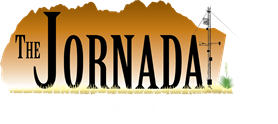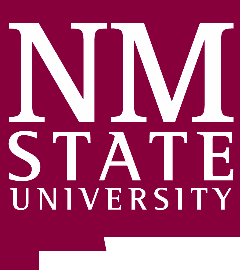
Photo credit: Ryan Schroeder
Jornada Virtual Symposium Presentations (November 12, 2020)
Below you will find links to recorded presentations and posters. The presentations represent recent Jornada research and outreach activities organized around four themes described below. They do not represent all work at the Jornada, but reflect the diversity of approaches we are taking to promote natural resources conservation and agricultural sustainability.
You will find videos of varying length and level of detail (all are on YouTube at our 2020 Jornada Symposium channel). You can choose topics and video lengths that suit you.
Climate adaptation in the Southwest
The USDA Southwest Climate Hub team prepared flash presentations (<3 minutes each) to showcase our climate adaptation projects. The Hub has three functional areas: 1) research, science synthesis, assessments, 2) tool evaluation, development and technology transfer, and 3) convening, outreach and education. These short presentations describe weather and climate challenges and adaptation solutions for agriculture, natural resources and communities in the southwestern United States.
USDA Climate Hubs: Advancing Conservation Under a Changing Climate by Emile Elias [video]
Stakeholder Engagement: Western Drought Resilience Workshop by Maude Dinan [video]
Sustainable Southwest Beef Project Overview by Reanna Burnett [video]
Snapshot of Rancher Perspectives on Creative Cattle Management Options by Skye Aney [video]
Decision Support Tool for the Beef Cattle Industry by Coury Dorn [video]
Grass-Cast: An Experimental Grassland Productivity Forecast by Lauren Kramer [video]
Low Cost Precipitation Monitoring Tools by Helena Deswood [video]
Incorporating Climate into Resource Management Decisions by Courtney Peterson [video]
Southwest Climate Hub Education Resources by Asombro Institute [video]
The Drought Learning Network by Caitriana Steele [video]
Southwest beef supply chains - strategies for sustainability
The first three sets of presentations explore climate-related challenges and strategies for sustainability in the beef supply chains originating from the Southwestern US. The last two sets of presentations examine how the strategies may influence environmental and socioeconomic outcomes, and how the agricultural producers of today and tomorrow perceive these strategies for sustainability.
Climate context
Long-term Declining Trends in Chihuahuan Desert Forage Production in Relation to Precipitation and Ambient Temperature by Matthew McIntosh [video]
Ranching strategies
Adaptation of Rangeland Beef Production to Climate Change in the Desert Southwest by Andres Cibils [video]
Criollo Cattle: A Focus on Sustainable Cattle Production by ranchers Alfredo Gonzalez, Cindy Tolle, and Rob Paulin [video]
Sustainable Southwest Beef Breed Comparison Study by Matthew McIntosh [video]
A Conversation about Precision Ranching Technologies with Sheri Spiegal and Tony Waterhouse [podcast]
Building and Testing a Precision Ranching System by Shelemia Nyamuryekung'e [video]
Feedlot finishing strategies
Recycling Nutrients among Distant Links of the Beef Supply Chain by Sheri Spiegal [video]
Sustainability outcomes of the strategies
Soil Health in New Mexico Rangelands by Carolina Brandani [video]
Evaluating Effects of Supply Chain Options by Mark Musumba [video]
Feedback from students and producers
Snapshot of Rancher Perspectives on Creative Cattle Management Options by Skye Aney [video]
New Mexico Bull Management by Keegan Taylor [video]
How to Play 'Solving the Beef' - a game by the Asombro Institute [video]
Ecosystem dynamics and management
The first set of presentations provide examples of how long-term and large-scale data resources are being used to understand ecosystem change on the Jornada Experimental Range. One presentation also describes how Jornada data are now managed and can be accessed by the public. The second set of presentations illustrate recent strategies for coupling monitoring data to models and Ecological Site Descriptions to inform management decisions in rangelands across the western U.S.
Ecosystem dynamics
A Century of Vegetation Change on the Jornada Experimental Range by Erica Christensen [video]
Shrub Cover Change in Southwest Rangelands Over the Past Decade by Wenjie Ji [video]
Hidden Biodiversity: How Soil Seed Banks Vary Across Ecological Sites and States in the Chihuahuan Desert by Kirsten Romig [video]
Predicting Lehmann's Lovegrass Expansion at the Jornada USDA-ARS Site Under Future Climate Scenarios by Dylan Burruss [poster]
Soil Isotopic Memory of C4 Grasses by Curtis Monger [video]
Navigating the Jornada Data Ecosystem by Greg Maurer, Darren James, and John Ragosta [video]
Management approaches and tools
Big Data, Local Science: Not an Oxymoron by Brandon Bestelmeyer [video]
Linking Erosion Prediction to Ecosystem Services through Big Ecological Data by Nick Webb [video]
Using Monitoring Data to Develop Ecological Site Concepts by Allie Heller [video]
Ecological Site Summaries and Applications for Condition Thresholds and Treatment Monitoring by Rachel Burke and Dylan Hardy [video]
Using Monitoring Data for Wind Erosion Assessments by Nick Webb [video]
Big data science and tools
Presentations describe a wide range of tools and research approaches that capitalize on “big data” (large datasets often housed in multiple, linked databases) and other technologies, such as web and mobile applications, to provide new insights about agricultural and ecological phenomena and provide spatially precise information to farmers and land managers.
LandPKS - Knowledge for Sustainable Land Management In Your Hands by Jeff Herrick [video]
Greening of North American Deserts: Predicting Grass Responses Using AI Technologies by Debra Peters [poster]
A Trans-Disciplinary Framework for Predictive Disease Ecology Based on Cross-Scale Interactions: Insight from Long-Term Data by Debra Peters [poster]
The DASH Portal: Supporting Agricultural Research by Automating Geospatial Data Tasks by Heather Savoy [poster]
The Pipeline of Data in Large-Scale Phenology Forecasts by Shawn Taylor [video]
Quality Assurance and Quality Control in Ecology by Sarah McCord [video]
A Web Interface for Creating Random, Spatially Balanced Landscape Monitoring Designs by Nick Webb [poster]
A Conversation about Benefits and Features of the LandPKS Habitat Module with Terri Schulz and Tegan May [video]
Please leave comments or questions about specific presentations or general themes here.
Our work is supported by the USDA Agricultural Research Service as well as the National Science Foundation funded Jornada Basin Long-Term Ecological Research program, USDA Long-Term Agroecosystem Research Program, USDA Southwest Climate Hub, the National Institute for Food and Agriculture Sustainable Southwest Beef Coordinated Agricultural Project, the Bureau of Land Management, and the Natural Resources Conservation Service.


